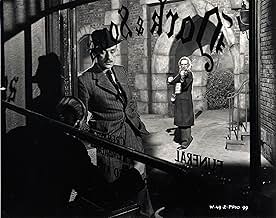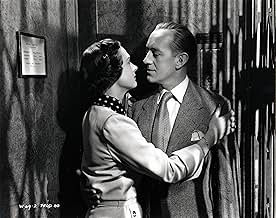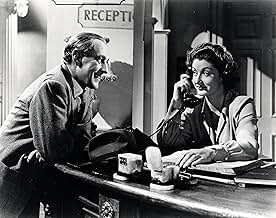VALUTAZIONE IMDb
7,3/10
2269
LA TUA VALUTAZIONE
Aggiungi una trama nella tua linguaWhen a lonely, unappreciated farm-equipment salesman discovers he has only a few weeks to live, he withdraws his savings for a final holiday at a "posh" resort.When a lonely, unappreciated farm-equipment salesman discovers he has only a few weeks to live, he withdraws his savings for a final holiday at a "posh" resort.When a lonely, unappreciated farm-equipment salesman discovers he has only a few weeks to live, he withdraws his savings for a final holiday at a "posh" resort.
- Regia
- Sceneggiatura
- Star
Grégoire Aslan
- Gambini
- (as Coco Aslan)
Eveline Kirkwood-Hackett
- Miss Hatfield
- (as Mme. Kirkwood-Hackett)
Recensioni in evidenza
What makes a film good? In this case it's the writing that first draws you in. Writer and co-producer J.B.Priestly (The Old Dark House '32 ~ An Inspector Calls '54) has a way with words that compels the viewer to want to know more about his characters. With wit and a sense of mystery, he surrounds us with multi layered groups of people that are mostly drawn together by chance. In 'Last Holiday' the cruel hand of fate brings us face to face with ultimate irony.
It's filled with marvelous situations, at first upsetting, then wryly funny, leading to an unexpected ending that invites us to examine the way we not only relate to others, but how we treat them. Priestly is examining the bias that all too often accompanies class consciousness. The cast is exquisitely diverse, everyone from bit players to mains, deliver sterling performances under direction from Henry Cass (Glass Mountain '49). Welsh born Cinematographer: Ray Elton (Quartet '48) with his strong grounding in documentaries, brings a realistic look to the fine work of Scottish art director Duncan Sutherland (San Demetrio London '43 ~ The Human Monster '49).
I found the music score by Romanian born composer Francis Chargrin surprisingly melodic for a 50s film of this type. Its thoughtful main theme is equally likable as his later 'The Beachomber' in '54. You might also remember Chargrin for his 'Colditz Story' '55, and 'Grey Friars Bobby' '61. Those who enjoy the always professional performances of Alec Guinness will enjoy his generally dour role in this off-beat mini classic.
My viewing was hindered by Australian TV broadcaster Gem's, persistence in supering 'pop-up' adds for up-coming shows, and their ridiculous LARGE lolly 'Pink' station ID. At least this time they screened the full film after inadvertently leaving out a reel in an earlier screening! Sure wish this broadcaster would treat their viewers, and the films they run with far more respect!
It's filled with marvelous situations, at first upsetting, then wryly funny, leading to an unexpected ending that invites us to examine the way we not only relate to others, but how we treat them. Priestly is examining the bias that all too often accompanies class consciousness. The cast is exquisitely diverse, everyone from bit players to mains, deliver sterling performances under direction from Henry Cass (Glass Mountain '49). Welsh born Cinematographer: Ray Elton (Quartet '48) with his strong grounding in documentaries, brings a realistic look to the fine work of Scottish art director Duncan Sutherland (San Demetrio London '43 ~ The Human Monster '49).
I found the music score by Romanian born composer Francis Chargrin surprisingly melodic for a 50s film of this type. Its thoughtful main theme is equally likable as his later 'The Beachomber' in '54. You might also remember Chargrin for his 'Colditz Story' '55, and 'Grey Friars Bobby' '61. Those who enjoy the always professional performances of Alec Guinness will enjoy his generally dour role in this off-beat mini classic.
My viewing was hindered by Australian TV broadcaster Gem's, persistence in supering 'pop-up' adds for up-coming shows, and their ridiculous LARGE lolly 'Pink' station ID. At least this time they screened the full film after inadvertently leaving out a reel in an earlier screening! Sure wish this broadcaster would treat their viewers, and the films they run with far more respect!
I love this film and it's one of the few I've watched time and time again. It's a forgotten jewel and is infrequently mentioned. For me it has everything that was important of it's era. The social comment is mingled into an entertaining story. How the Health Service is expanding but people go hungry. An over worked Doctor making mistakes. George Bird being projected into a world that is not his own. The irony of riches coming his way when he thinks he has little time left. The Union's getting their grip on the country with strike action. How the upper classes view the lower and vice versa. How George Bird is now viewed as upper class because of his new setting. Post war money laundering. How war heroes can't find work. Love and jealousy. And the ironies - how he buys a dead man's clothes. How he swerves a car to avoid a dog that is due to be destroyed and turns into a road called 'Fallow End.' Then there is the acting. Sid James gives one of his great performance. His 1940's and 1950's work was superb. Sadly remembered for his Carry On performances more than the superb actor that he was. He just holds the scenes and in some cases is competing well with Guinness. For Guinness this is an early film. Ernest Thiesiger makes a great appearance along with many others including the delightful Kay Walsh. Esma Cannon's acting is well done - better than her later performances where 'silly' scripts let her down.
Please do see it if you can. It's a little gem.
Please do see it if you can. It's a little gem.
Alec Guinness stars in "Last Holiday," a 1950 British film which was remade years later with Queen Latifah as the star. Though I enjoyed the warmth of the later version, the Guinness "Last Holiday," no surprise, is superior.
Guinness plays a lower class Brit, George Bird, who is told he is going to die of a rare disease and has maybe a few months left to live. George quits his job, takes his savings, and goes to stay at a ritzy resort. There, he changes, and circumstances change for him. With nothing to loses any longer, he becomes outspoken. He also wins at poker, croquet, and a horse race. He's offered jobs. And there's the possibility of romance.
This is supposedly a comedy, but it's not an uproarious one. It's more drama, in fact. George Byrd finds that all these wealthy people aren't all they're cracked up to be. He also finds out that when you let go and stop trying, opportunities appear. And he learns the difference between passing the time and doing something with your time.
Alec Guinness is brilliant as George, timid at first, gaining stature with his new clothes, and asserting himself once he gets to the resort. It's a beautifully layered performance.
Despite some sadness within the film, this is an excellent story of a man who learns life's lessons in a narrow space of time.
Guinness plays a lower class Brit, George Bird, who is told he is going to die of a rare disease and has maybe a few months left to live. George quits his job, takes his savings, and goes to stay at a ritzy resort. There, he changes, and circumstances change for him. With nothing to loses any longer, he becomes outspoken. He also wins at poker, croquet, and a horse race. He's offered jobs. And there's the possibility of romance.
This is supposedly a comedy, but it's not an uproarious one. It's more drama, in fact. George Byrd finds that all these wealthy people aren't all they're cracked up to be. He also finds out that when you let go and stop trying, opportunities appear. And he learns the difference between passing the time and doing something with your time.
Alec Guinness is brilliant as George, timid at first, gaining stature with his new clothes, and asserting himself once he gets to the resort. It's a beautifully layered performance.
Despite some sadness within the film, this is an excellent story of a man who learns life's lessons in a narrow space of time.
A small-town salesman, George Bird, learns that he is suffering from an incurable condition, leaving him only weeks to live. With no family or friends to care for, he decides to spend his modest savings on his first and last stay in a grand hotel.
The other guests soon notice that he is new to hotel life, and react to him in different ways - some disdainful, some intrigued and friendly. These guests reflect the old English class-system, with its myriad of sub-classes, starting to die out by 1950, largely because of the left-wing postwar government that had been so championed by J.B. Priestley, author of this screenplay.
Before long, Bird's life seems to be opening out, with job-offers, investment opportunities, even a chance of love. A bitter irony of course, as these opportunities will never be enjoyed (or so we are to assume).
The comfortable hotel life gets a jolt when the staff are suddenly called-out on strike, instantly shaking-up the class-system, as all the guests have now got to try to pitch-in and help, as best they can. This provides for a number of accidental meetings that move the plot forward dramatically. And the effect on Bird's humdrum life, suddenly turned roller-coaster, is dramatic indeed.
Interesting to see the yet-undiscovered Sid James as a dodgy gambler, and David McCallum's father (also David) on the violin, beginning and ending the story with a simple but curiously haunting theme.
For a film that has given so much pleasure - check the other IMDb reviews - it may seem spoilsport to suggest that Alec Guinness does not quite carry conviction as such a small and narrow character as Bird. This is someone who just earns his daily pittance and then goes home to read the paper and smoke his pipe. For this role, Guinness simply looks and sounds too cultivated, too sociable, altogether too biddable. (Ironically there was a character actor called Norman Bird, who would have been perfect!)
The other guests soon notice that he is new to hotel life, and react to him in different ways - some disdainful, some intrigued and friendly. These guests reflect the old English class-system, with its myriad of sub-classes, starting to die out by 1950, largely because of the left-wing postwar government that had been so championed by J.B. Priestley, author of this screenplay.
Before long, Bird's life seems to be opening out, with job-offers, investment opportunities, even a chance of love. A bitter irony of course, as these opportunities will never be enjoyed (or so we are to assume).
The comfortable hotel life gets a jolt when the staff are suddenly called-out on strike, instantly shaking-up the class-system, as all the guests have now got to try to pitch-in and help, as best they can. This provides for a number of accidental meetings that move the plot forward dramatically. And the effect on Bird's humdrum life, suddenly turned roller-coaster, is dramatic indeed.
Interesting to see the yet-undiscovered Sid James as a dodgy gambler, and David McCallum's father (also David) on the violin, beginning and ending the story with a simple but curiously haunting theme.
For a film that has given so much pleasure - check the other IMDb reviews - it may seem spoilsport to suggest that Alec Guinness does not quite carry conviction as such a small and narrow character as Bird. This is someone who just earns his daily pittance and then goes home to read the paper and smoke his pipe. For this role, Guinness simply looks and sounds too cultivated, too sociable, altogether too biddable. (Ironically there was a character actor called Norman Bird, who would have been perfect!)
The central character (Guiness) is "a modest unassuming salesman of agricultural implements" (Wikipedia). A respectable almost classless person whose unassuming manner, unglamorous job and modest salary have limited his social circle. For the first (and last) time circumstances allow him to spend freely and, for want of any other idea, stay a few weeks at a very upmarket seaside hotel. Its clientele have only one thing in common: either possessing wealth or using the opportunity to accumulate it. Some are rich and lack class, others have power and status as well as wealth. The Guinness character for the first time has an opportunity to network with important people.
Guinness in a way reprises his role in The Man in the White Suit - a thoroughly honest man innocent in the ways of the world whose modest manner and appearance belies his inventive genius. Yet is remarkably unchanged by success and continues to treat both high and low equally - and cause a surprising degree of unintended upset.
A good story with excellent cast, it is a less demanding part for the chameleon genius of Guinness. As usual with Priestley very well crafted story-telling. However the film dates from 1950 - 5 years after WW2 when people were looking to a better future and trying to put grief behind them. During WW2, Priestley had been the nation's uncle, providing not false comfort but a steadying presence putting the worlds events into a assimilable form for the average person. With the end of the war, the public's need for Priestley (much as their need for Churchill) ended. The film's sour end seems to have no point other than to say just when things are looking up and people at their most cheerful and optimistic, everything can be be dashed to the ground in an instant.
Guinness in a way reprises his role in The Man in the White Suit - a thoroughly honest man innocent in the ways of the world whose modest manner and appearance belies his inventive genius. Yet is remarkably unchanged by success and continues to treat both high and low equally - and cause a surprising degree of unintended upset.
A good story with excellent cast, it is a less demanding part for the chameleon genius of Guinness. As usual with Priestley very well crafted story-telling. However the film dates from 1950 - 5 years after WW2 when people were looking to a better future and trying to put grief behind them. During WW2, Priestley had been the nation's uncle, providing not false comfort but a steadying presence putting the worlds events into a assimilable form for the average person. With the end of the war, the public's need for Priestley (much as their need for Churchill) ended. The film's sour end seems to have no point other than to say just when things are looking up and people at their most cheerful and optimistic, everything can be be dashed to the ground in an instant.
Lo sapevi?
- QuizRemade in 2006 with Queen Latifah in the lead role.
- BlooperBird states that he made about 9 Pounds a week. This is about 470 Pounds per annum. When his manager is trying to get him to stay he first offers to raise his salary to 400 Pounds p.a.
- Citazioni
George Bird: How do you keep smiling with a stiff upper lip?
- ConnessioniRemade as L'ultima vacanza (2006)
I più visti
Accedi per valutare e creare un elenco di titoli salvati per ottenere consigli personalizzati
- How long is Last Holiday?Powered by Alexa
Dettagli
- Tempo di esecuzione1 ora 28 minuti
- Colore
- Proporzioni
- 1.33 : 1
Contribuisci a questa pagina
Suggerisci una modifica o aggiungi i contenuti mancanti

Divario superiore
By what name was Last Holiday (1950) officially released in India in English?
Rispondi






























